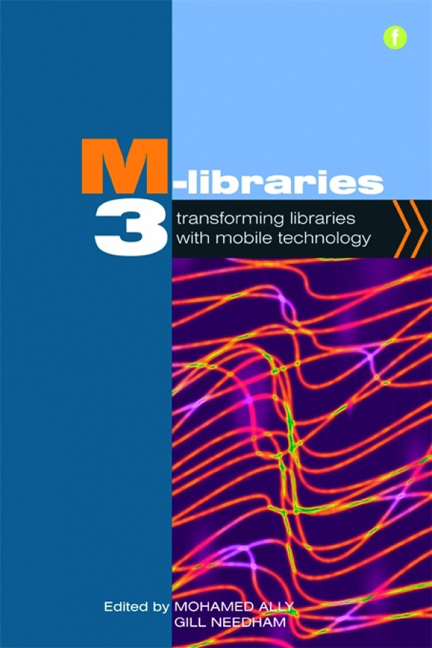Introduction
Published online by Cambridge University Press: 08 June 2018
Summary
Since the publication of the second book in this series (Ally and Needham, 2010) the field of mobile service delivery has matured considerably and is transforming how libraries operate. Mobile devices have become ubiquitous and libraries around the world have begun to engage with the opportunities they offer – some in experimental mode and some as mainstream services. Advances in technology present both challenges and opportunities. The contents of this latest book reflect the variety of approaches being taken and present a rich panoply of experiences from many corners of the globe – 21 chapters from 11 countries as far apart as Spain and New Zealand, India and Japan, South Africa and the USA.
The book opens with a chapter by Mohamed Ally in which he describes the role of libraries in providing education for all. There are many global initiatives being implemented to provide at least a basic education to citizens around the world regardless of location, background and economic status. This chapter summarizes these education-for-all initiatives and explores how libraries could be transformed to provide education for all. The remainder of the book is divided into three thematic parts. The first is Developing Mobile Services. It includes seven chapters from six countries, each describing the experience of researching, planning and implementing a diverse range of services for mobile users.
Deakin University in Melbourne, Australia, serves a large proportion of distance learning students as well as students based on campuses in three geographical locations. Colin Bates and Rebecca Carruthers explain in Chapter 2 that these factors support the increasing use of mobile technologies. In their chapter they describe the development of mobile library services as part of a broader, university-wide mobile strategy. They have a programme of ongoing experimentation with new devices for both staff and students, and they share the feedback they have gathered from various small-scale trials.
The University of South Africa (Unisa) is one of the world's largest universities and, with more than 308,000 students, is the largest distance teaching institution in Africa. In Chapter 3, Jenny Raubenheimer points out that Africa is the fastest-growing mobile phone market in the world and that mobile phones are now regarded as the equivalent of personal computers for the African continent.
- Type
- Chapter
- Information
- M-Libraries 3Transforming libraries with mobile technology, pp. xxix - xxxivPublisher: FacetPrint publication year: 2012



